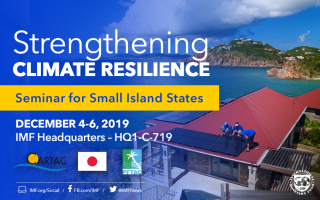
Posted by Guohua Huang and Richard Allen[1]
The Fiscal Affairs Department of the IMF, in collaboration with the Fund’s Regional Technical Assistance Centers in the Caribbean and Pacific, organized a seminar on the role of PFM in building climate resilience on December 4-6, 2019 at the IMF’s HQ. The seminar brought together senior officials of finance ministries of 26 small island states from the Caribbean, Pacific, and Indian Ocean, development institutions, and bilateral donors.
Good PFM systems are fundamental for mitigating the economic and social impact of intensifying climate disasters, such as hurricanes or cyclones (in the Southern hemisphere). Building resilient roads, bridges, buildings and other infrastructure is at the top of the agenda of small island states. But other political and economic priorities also need to be considered. Many small island states face significant fiscal space constraints in finding the resources for investment in new infrastructure. Accessing external climate funds, such as the Green Climate Fund, can fill part of this gap.
IMF research has shown that countries typically waste a lot of resources through inefficient infrastructure investment. The Public Investment Management Assessments (PIMA), the IMF’s key tool for assessing infrastructure governance, can help countries assess and strengthen these institutions. Climate resilient elements can be integrated into the investment cycle, from the planning to the implementation of projects. For example, evidence-based climate vulnerability assessments should be conducted when investment plans are developed. And climate resilience should be a critical criterion for the appraisal and selection of infrastructure projects.
Robust PFM systems are also critical to ensure efficient recovery after natural disasters. In such situations, however, emergency codes and procedures are invoked and the normal “business as usual” PFM systems are bypassed. For example, approved contractors are hired through accelerated procurement rules to work on essential restoration works. Emergency sources of funds are tapped. Large reallocations of the budget may need to be made.
The importance of developing a PFM continuity plan for post disasters attracted lots of attention during the seminar. The PFM challenges posted by the hurricane Maria on Dominica in 2017 was shocking to seminar participants. The need for backup systems to replace or support systems that were destroyed or compromised, the capacity to make manual payments of salaries and other essential purchases, the careful management of liquid funds on hand, among others, were very useful lessons for other countries.
Climate change (CC) polices are an example of a cross-cutting issue in public finance. Other examples are poverty reduction, and gender-related budgeting. All three of these policies are represented in the SDGs and their efficient management is essential. Cross-cutting issues face many challenges that were discussed during the seminar. In many countries, organizational responsibility for CC policy may be split between several ministries or agencies (e.g., infrastructure, environment, education, local government). And CC financing may come from multiple resources such as the state budget, funds established outside the budget, state-owned enterprises, local governments, and external aid. This fragmentation of organizational responsibilities and financing sources can result in inefficient decision making, poor prioritization, under-funding of CC, and inadequate crisis responses.
These challenges do not warrant a new approach of PFM. Rather, existing PFM systems can be adapted to support the implementation of CC policies. Initiatives taken in many countries to promote good gender-responsive budgeting provide useful guidelines for the good management of CC policies. The key is to properly define critical entry points for these policies. For example, adjustments may be needed to a country's constitution and laws to establish rules and procedures for promoting good CC. Policy statements on CC issued by the government could provide a framework for setting strategic goals for CC policies, allocating resources, and tracking progress. The annual budget circular could include a requirement for agencies to make requests for spending on CC policies in their budget submissions. CC impact assessments could measure the impact of fiscal and other policies on outputs and outcomes from a climate perspective. Finally, ex post evaluations or audits could assess the impact and effectiveness of CC-related spending or tax incentives.
Some participants raised concerns about the limited human capacity and capability of small island states. Capacity supplementation by rich neighbors such as Australia and New Zealand in the Pacific may help alleviate these problems, but also raise challenges of how to develop local capacity. While some small island states may have already developed relatively advanced PFM systems, many others may still struggle with the basic budgeting and accounting functions. The international communities’ support is critical for capacity development to respond to these challenges. The support should be tailored to recipient countries’ specific situations given the widely differing levels of their PFM capacity. Development partners need to better coordinate their support. Sometimes, small island states may be overloaded with multiple diagnostic tools used by various development partners that sometimes lead to inconsistent identification of reform priorities.
[1] Guohua Huang and Richard Allen are Senior Economists working on PFM issues in the Fiscal Affairs Department of the IMF.
The posts on the IMF PFM Blog should not be reported as representing the views of the IMF. The views expressed are those of the authors and do not necessarily represent those of the IMF or IMF policy.







